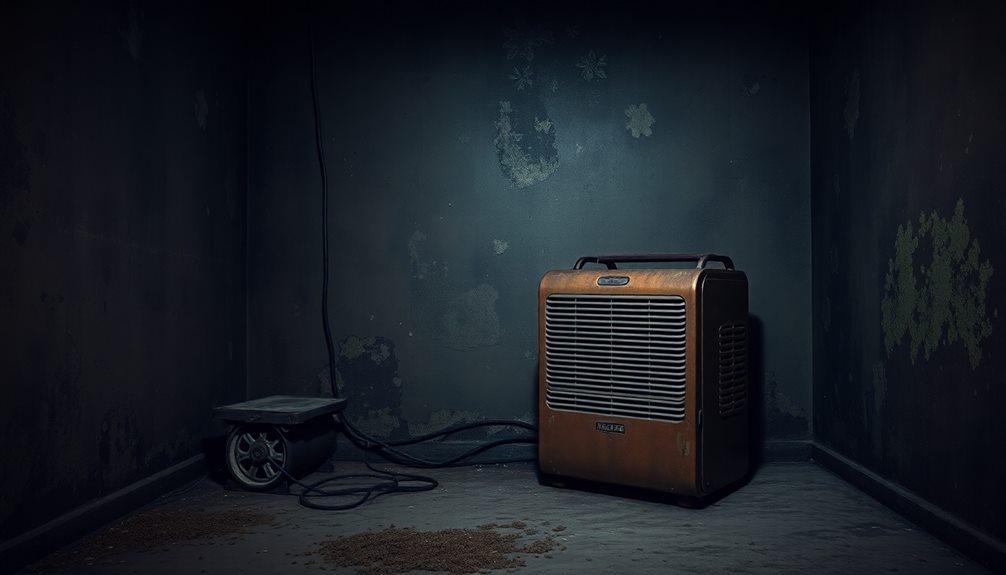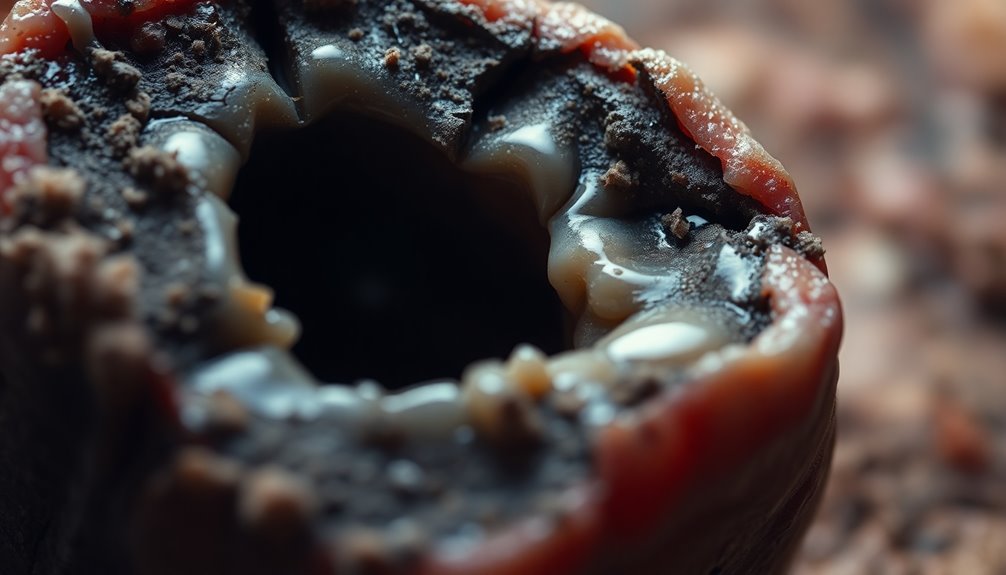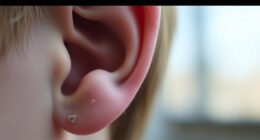Mold in a house typically smells musty and damp, much like decaying wood or a wet sponge. You might notice hints of sourness or a stale aroma that lingers on your clothes and hair. This heavy, earthy scent often shows up in dark, damp areas like basements and bathrooms. If you catch a whiff, it's a sign to investigate further! Mold can pose health risks and damage your home, so addressing the source of the smell is super important. Want to learn how to tackle those moldy odors and keep your space fresh? There's more to discover!
Key Takeaways
- Mold smells musty, often resembling damp, decaying wood or a wet sponge.
- The odor can evoke a sour or stale aroma that clings to clothing and hair.
- Hints of rotten leaves or a damp forest floor may be present in the smell.
- The musty odor typically originates from damp, dark areas like basements and bathrooms.
- Detection of the mold smell signals potential air quality issues and health risks.
Introduction

Mold smell in a house can be more than just an unpleasant odor; it often signals a hidden problem that needs addressing. If you've noticed a musty scent lingering in your home, it's time to take action.
Mold thrives in damp and dark places, so you might find it in areas like basements, bathrooms, or behind walls. Ignoring that smell won't make it disappear; in fact, it could lead to more significant issues down the road.
When you breathe in that moldy smell, think of it as a little alarm bell ringing, urging you to investigate further. Mold can't only damage your home but also affect your health.
It can cause allergies, breathing problems, and other issues, especially for those with sensitivities. By tackling the problem early, you can save yourself a lot of trouble and expense later.
Description of the Smell

The unmistakable odor of mold often resembles the scent of damp, decaying wood or a musty basement. When you walk into a room with mold, it hits you like a wet sponge. It's that heavy, earthy smell that lingers in the air, making you feel like you've stepped into an old, forgotten attic.
You might notice a sour or stale aroma that clings to your clothes and hair, almost like a wet towel left too long in the laundry. This odor isn't just unpleasant; it can be a sign of hidden moisture and potential health risks.
As you breathe in, you might also catch hints of something akin to rotten leaves or soil, reminding you of a damp forest floor after rain. It's a smell that's hard to ignore, and once you detect it, you'll likely want to investigate further.
When you encounter this musty scent, don't brush it off. It's your nose's way of telling you that something mightn't be right in your living space.
Source and Composition
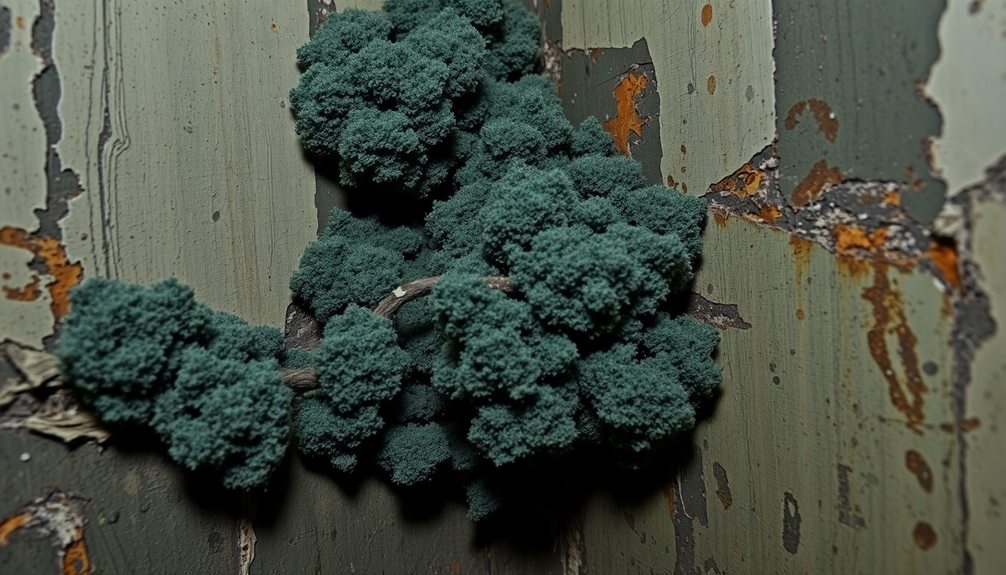
Identifying the source of that musty smell is key to understanding the mold issue in your home. Mold thrives in damp and dark areas, so check places like basements, bathrooms, and under sinks. You might find it hiding behind walls or in your attic, where moisture can accumulate.
The smell itself comes from tiny particles called microbial volatile organic compounds (MVOCs) that mold releases as it grows. These compounds have a distinctive scent, often described as earthy or musty. When you catch a whiff of that odor, it's your nose telling you that mold is nearby, signaling trouble.
Mold can be various colors, including black, green, or white, and you mightn't always see it. If you notice that musty smell, it's essential to investigate further. Don't ignore it! Mold can affect air quality and your health, so addressing the source should be a priority.
Once you locate the source, you can take steps to remove the mold and prevent it from returning. Remember, keeping your home dry and well-ventilated is your best defense against mold growth.
Typical Scenarios or Environments
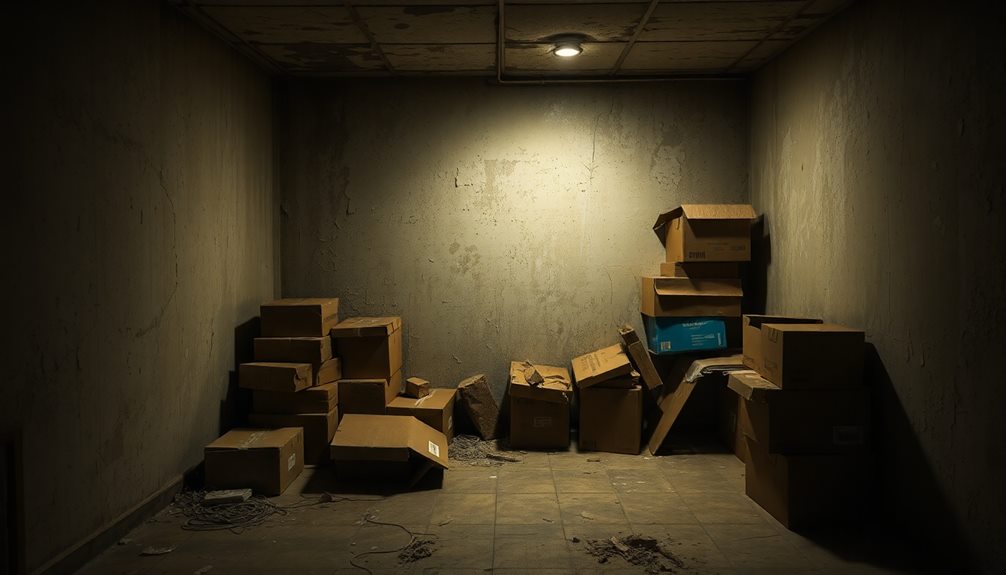
In many homes, mold tends to flourish in specific scenarios or environments where moisture and lack of ventilation create ideal conditions.
One common spot is in bathrooms, especially if they're not well-ventilated. When you take a hot shower, steam builds up, and if that steam has nowhere to escape, it can lead to mold growth on walls, ceilings, and even behind tiles.
Kitchens are another hotspot. Cooking can produce a lot of moisture, especially if you're boiling water or frying foods. If your kitchen lacks proper airflow, mold might take root in hidden corners or under the sink, where leaks can go unnoticed.
Basements are also notorious for mold. They're often damp and dark, making them perfect for mold to thrive. If you've got any leaks or high humidity, you might smell that musty odor creeping up the stairs.
Lastly, attics can harbor mold, especially if there's poor insulation or roof leaks. It's crucial to keep these areas well-lit and dry.
Emotional or Cultural Associations

Mold smells often evoke strong emotional reactions and cultural associations that can shape how people perceive their living environments. When you catch a whiff of that musty scent, it might remind you of an old, forgotten basement or a rainy day spent indoors. These memories can stir feelings of nostalgia or even discomfort.
Culturally, mold has different meanings. In many places, it symbolizes neglect or decay, making you feel uneasy about a home's upkeep. Yet, in some cultures, mold can be a sign of nature reclaiming space, showcasing resilience amidst change. This duality can influence how you respond to a moldy smell.
You might also consider how these associations affect your relationships with spaces. Say you visit a friend's house and notice a musty odor. It could create a barrier, making you less comfortable. On the flip side, if you're aware of the history behind that smell, it might spark an interesting conversation!
Ultimately, understanding these emotional and cultural connections helps you navigate your feelings about mold smells, making your living environment more meaningful and relatable.
Health or Safety Considerations
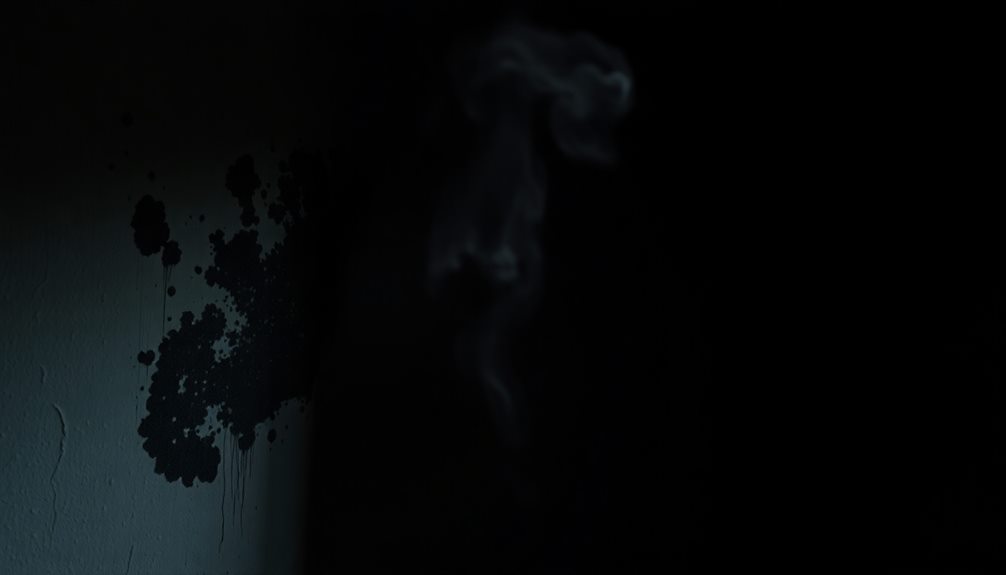
The emotional and cultural associations tied to mold smells can often overshadow the more pressing health and safety concerns they present. When you notice a musty odor in your home, it's time to pay attention.
Mold can lead to serious health issues, especially for those with allergies or asthma. Breathing in mold spores can trigger symptoms like sneezing, coughing, and itchy eyes. In some cases, prolonged exposure can even cause respiratory infections.
If you find mold growing in your home, it's crucial to act quickly. You don't want to let it spread. Make sure you're wearing protective gear, like gloves and a mask, while cleaning it up.
Also, ensure there's good ventilation in the area. This helps reduce the concentration of spores in the air.
In addition, you should check for any sources of moisture that might be encouraging mold growth, such as leaks or high humidity. Addressing these issues not only keeps your home safe but also protects your health.
Final Thoughts
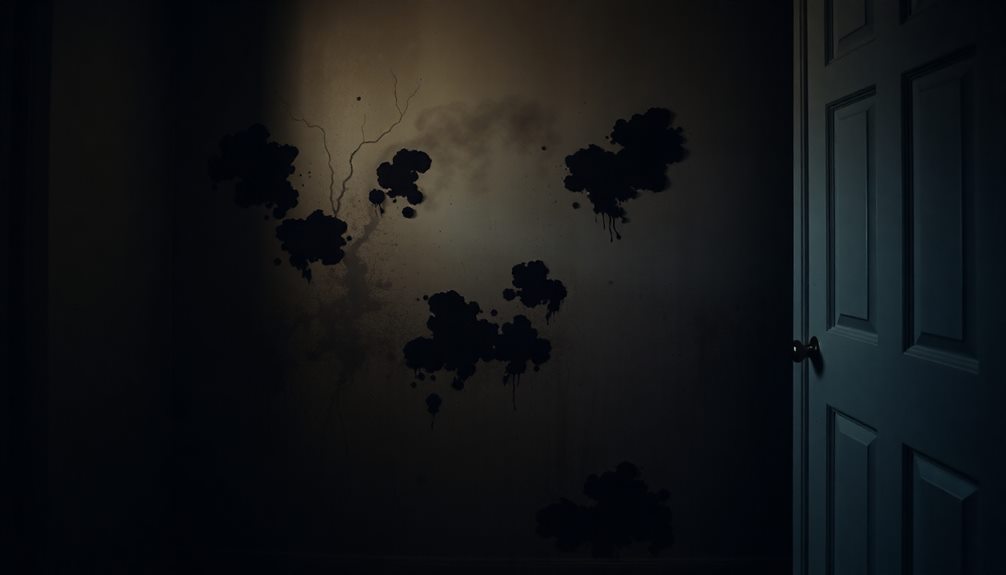
Addressing mold smells in your home is essential for maintaining both a healthy environment and your peace of mind. When you notice that musty odor, don't ignore it! It's your home trying to tell you something important. Mold can't only affect your indoor air quality but also impact your health over time.
First, investigate where that smell is coming from. Check damp areas like basements, bathrooms, or even behind appliances. Once you identify the source, you can take action! Whether it's fixing leaks, improving ventilation, or cleaning with appropriate mold removers, every step you take helps make your home safer.
Remember, prevention is always better than cure. Regularly inspect your home and keep it dry. Open windows to let fresh air in, and use dehumidifiers if needed. By doing so, you reduce the chances of mold returning.
Taking these steps will help keep your home fresh and inviting. You'll enjoy a space that feels good to live in, and you'll breathe easier knowing you've tackled that mold smell.
Frequently Asked Questions
Can Mold Smell Vary Between Different Types of Mold?
Absolutely, mold smell can vary between different types. Some molds emit a musty odor, while others might have a sharper or more pungent scent. You might notice distinct smells depending on the mold type present.
How Can I Differentiate Mold Smell From Other Odors?
To differentiate mold smell from other odors, pay attention to its musty, damp scent. It's often stronger in humid areas. If you notice a persistent odor that doesn't fade, it's likely mold-related.
What Should I Do if I Smell Mold in My Home?
If you smell mold in your home, act quickly. Inspect for visible mold, check for damp areas, and improve ventilation. Consider using a dehumidifier, and if necessary, call a professional to assess and remediate the issue.
Can Mold Smell Linger After Remediation?
Yes, mold smells can linger after remediation. Even if the source is removed, residual odors might persist. You should ventilate the area, use air purifiers, and clean surfaces to help eliminate any remaining smells.
Does Mold Smell Affect Home Resale Value?
Yes, mold smell can definitely affect your home's resale value. Potential buyers might worry about hidden damage or health risks, making them hesitant to purchase. Addressing the issue properly can help maintain your property's appeal and value.
